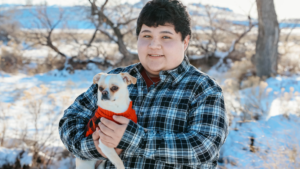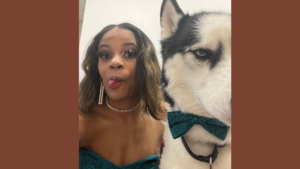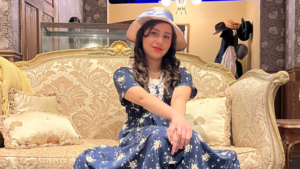This guest post is by Gabriel Morel, a young man who attends North Carolina School of the Arts. He is an advocate for the Spring 2025 Making a Difference Autism Scholarship via the nonprofit KFM Making a Difference started by me, Kerry Magro. I was nonverbal till 2.5 and diagnosed with autism at 4 and you can read more about my organization here.
Autistics on Autism the Next Chapter: Stories You Need to Hear About What Helped Them While Growing Up and Pursuing Their Dreams was released on Amazon on 3/25/25 and looks at the lives over 75 Autistic adults. 100% of the proceeds from this book will go back to supporting our nonprofits many initiatives, like this scholarship program. Check out the book here.
I was fortunate enough to receive a diagnosis of autism at a young age, although I was not initially grateful for this diagnosis when I had first received it. After being diagnosed with autism while I was in second grade, I attempted to convince myself and others that the diagnosis was not accurate. I do not believe that it was until around the time I was in eighth grade that I accepted my diagnosis. Looking back on it now, I am not exactly sure why processing the reality that I have autism was so difficult for me. Growing up, I often felt separated from other kids that were around the same age as me. I struggled to talk to psychologists about these problems, although they were still able to notice my symptoms through our individual interactions with one another. Regardless of what grade I was in, those around me would make comments about my symptoms and treat me differently due to this. I generally had a hard time maintaining friendships, as I found it challenging to relate to other people and their own emotions. I have also always struggled with eye contact, and have been described to be somewhat aloof by the people I have interacted with. Despite this, my overall social skills have improved immensely since I was first diagnosed, although I do still have noticeable autistic traits that can often make me feel a sense of separation from those around me who can not relate to my symptoms.
I have found that learning to come to terms with the diagnosis itself, has really benefited me and allowed me to understand why I might experience certain symptoms. Over time, I did realize that being diagnosed with autism did differentiate me to an extent in comparison to those who are not also diagnosed with the condition, but it does not limit me and my capabilities. Many of the most meaningful friendships I have now are with other people that are also diagnosed with autism, as I have found that it is easier to relate to their own experiences, due to us sharing a diagnosis. I do not have many memories from my childhood around other people that I look back on fondly, and this was largely due to the fact that I felt severely separated from other people within my age group, although I was unaware for the reasoning behind this. Many of my memories from my childhood consist of emotionally relying on the interests that I was most passionate about, as this provided me a very important sense of escapism that I have always been attached to and has provided me with comfort. A downside of this is that I was so passionate about some of these interests, that it was difficult for me to have conversations related to anything outside of this topic. This would often restrict my capabilities to maintain a social interaction for long periods of time, especially if they did not share the same interest as what I might have been passionate about at the time.
Most of elementary school for me did feel somewhat alienating, due to me not being able to talk to any other kids my age about my diagnosis, or explain why I felt different from those that were the same age as me. Middle school however, was when I noticed being treated differently from those around me. Even though nobody in my classes ever used the word “autistic” to describe me, they would often belittle me for the autistic symptoms that I would convey in front of them. I also lacked having any close friends throughout those years, so the feelings of isolation and detachment from other people my age significantly worsened. Eventually in seventh grade, I decided to do school online instead. I have been doing school online since then, although I intend to change this once I go to college in August. If it wasn’t for these experiences in middle school, it likely would have taken me longer to realize the accuracy of my diagnosis of autism. I had been trying for a long time to convince myself that I did not have the disorder, although I eventually realized that my symptoms were part of the reason why I had been treated so differently.
Despite some of these many downsides of growing up with autism, I do not believe it has had an entirely negative impact on my childhood, or my life as a whole. Now that I have aged, I can proudly say that I am an individual with autism, and there are many ways where the condition could even benefit me. I am thankful that I am more passionate about my interests than most people, as developing these fixations on a variety of media and skills has allowed me to develop many of my own capabilities. It has especially helped me creatively, as my passion towards film especially has allowed me to focus strongly on projects that I have worked on as a director and screenwriter. What I am most appreciative of, is how I can relate to the experiences of other neurotypical people, and how we are able to bond over the symptoms we have with one another. Ultimately, even though autism can often be hard to live with, I am beyond thankful that I was able to receive a diagnosis, and that the negative aspects of it no longer feel detrimental to my experiences with living with the disorder.
Kerry Magro, a professional speaker and best-selling author who is also on the autism spectrum started the nonprofit KFM Making a Difference in 2011 to help students with autism receive scholarship aid to pursue a post-secondary education. Help us continue to help students with autism go to college by making a tax-deductible donation to our nonprofit here.
Also, consider having Kerry, one of the only professionally accredited speakers on the spectrum in the country, speak at your next event by sending him an inquiry here. If you have a referral for someone who many want him to speak please reach out as well! Kerry speaks with schools, businesses, government agencies, colleges, nonprofit organizations, parent groups and other special events on topics ranging from employment, how to succeed in college with a learning disability, internal communication, living with autism, bullying prevention, social media best practices, innovation, presentation best practices and much more!














